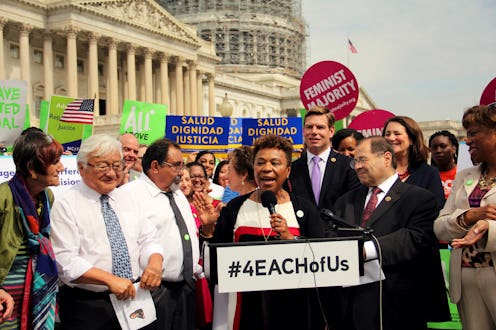News
The Hyde Amendment Is Finally Falling Out Of Favor

Despite not being a permanent law, the Hyde Amendment has disproportionately restricted abortion access for low-income women (many of whom are women of color) for going on four decades. As one of the first major legislative victories for the pro-life movement, the Hyde Amendment banned certain federal funds, specifically Medicaid, for being used for abortion unless in the case of incest or rape. The Hyde Amendment was first passed in 1976, just three years after the Supreme Court had legalized abortion with their landmark ruling in Roe v. Wade, and has continued to be pushed through Congress in various forms for 40 years. But are the Hyde Amendment's days numbered? Polls show public support might be shifting away from the Hyde Amendment.
Although the Hyde Amendment has been around for 40 years Friday, it's not a federal law. Rather, the Hyde Amendment is a budget rider attached (and approved) annually to appropriations bills to restrict Medicaid from covering abortion except in cases of incest, rape, or the endangerment of the mother. While the Hyde Amendment could easily be done away with by dropping it from appropriation bills, it has been approved in one form or another since 1976. It was even upheld by the Obama administration when the Affordable Care Act was passed.
But abortion services are not cheap. In-clinic abortions can cost up to $1,500 in the first trimester while the abortion pill can run up to $800, according to Planned Parenthood. This puts abortion out of reach for many women using federal health insurance programs like Medicaid, pushing them into back alleys or unplanned childbirth. As more information regarding how the Hyde Amendment disproportionately affects low-income women — one in four low-income women seeking an abortion are reportedly denied access — becomes available, public sentiment may finally be turning.
A Hart Research Associates poll of 950 voters conducted in 2015 on behalf of All* Above All, a group working to ensure abortion coverage for low-income women, found 74 percent of voters agreed "as long as abortion is legal, the amount of money a woman has or does not have should not prevent her from being able to have an abortion." The poll found more than half of voters — 56 percent — supported legislation that requires Medicaid to cover abortion services along with other pregnancy and reproductive-related care.
And lawmakers and politicians are beginning to take note. Democratic nominee Hillary Clinton's presidential campaign platform includes a proposal to repeal the Hyde Amendment that was formally adopted by the party last summer. In Congress, Rep. Barbara Lee of California and dozens of other legislators including Rep. Jan Schakowsky of Illinois have introduced the EACH Woman Act, legislation aimed at lifting bans on abortion coverage in public health insurance programs like Medicaid, Medicare, and the Children's Health Insurance Program.
Supporters of the EACH Woman Act argue the Hyde Amendment essentially revokes the constitutional right to abortion handed down by the Supreme Court in Roe v. Wade from low-income women and women of color. In fact, the legislation's chief sponsor, Republican Congressman Henry Hyde freely admitted that was one of the bill's main goals when introducing the bill to the House. "I would certainly like to prevent, if I could legally, anybody having an abortion: a rich woman, a middle-class woman, or a poor woman," Hyde reportedly said. "Unfortunately, the only vehicle available is the [Medicaid] bill."
Although the EACH Woman Act was introduced in the House more than a year ago, no vote or debate has yet been held on it. However, Hart Research Associates' survey found that seven in 10 voters polled agreed it made "good sense" for federal heath insurance programs to cover birth control and abortion, noting that planned and prepared-for pregnancies are good for children and families. It's hard to deny that families and children prosper when women of all racial and socioeconomic backgrounds are allowed to make their own personal health care decisions, planning what and when is right for them.
"Elected officials need to stay out of women’s private health care decisions," Lee tells Bustle. If the EACH Woman Act were to pass, she believes it will finally equalize access to a full range of health services for women no matter what their socioeconomic status. "It would address the issue of equality and stop the blatant discrimination taking place," she says.
Additional reporting by Celia Darrough
Image: Chelsea LaSalle/Bustle (1)